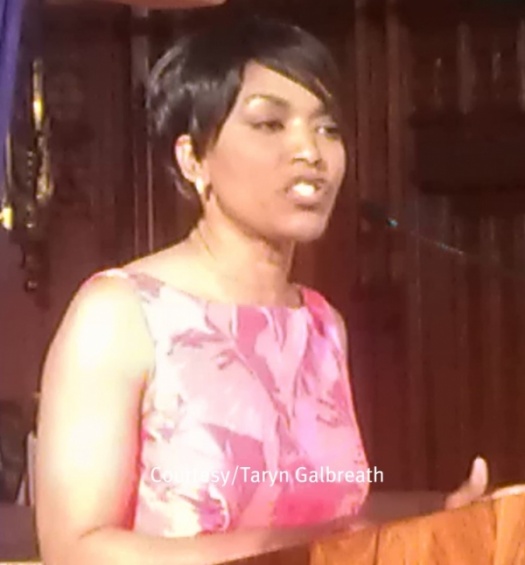
Her innocent and elegant pastel pink dress was demure but illusory to a profound and passionate speech prefaced by a riveting monologue, when actress Angela Bassett visited St. Sabina Church recently as part of its African American Speaker Series.
Her innocent and elegant pastel pink dress was demure but illusory to a profound and passionate speech prefaced by a riveting monologue, when actress Angela Bassett visited St. Sabina Church recently as part of its African American Speaker Series.
Radiating her award-winning talent, Ivy League erudite and diverse experience, Bassett, addressing a crowd of over 500, discussed cultural and economic issues facing the Black community in Chicago and nationwide, and their relevance to the Rev. Dr. Martin Luther King Jr.’s legacy.
She opened with a compelling monologue traversing a people’s history of continued struggle and triumph, which conveyed only a glimpse of her performing capacity. “It’s always a joy to be on the South Side of Chicago,” she said. “This area holds so much significance in Black history. In American history…it’s been the center of Jazz, the inspiration for literature, the birthplace of great black businesses — and of course, the home of our President.”
But despite an African-American president from Chicago, “We would be wrong to think that we have reached the ‘Promised Land,” she said. Referencing the recent opening of the King Memorial in Washington D.C., Bassett noted the Black community still struggles economically, as well as with social inequality, saying, “All too frequently we are reminded that we still have hills to climb where race and justice are concerned.”
While the entire nation is now struggling with layoffs, foreclosures and bankruptcy, “whatever ills the nation is suffering, the Black community… suffers double,” said the Academy Award-nominated actress, adding, “Unless you’re of a certain age you probably thought that struggle was something that you would never experience — until the last few years of serious recession woke you up. …The struggle continues.”
“Forty-four years [after King], despite dramatic progress, there are still many challenges ahead. Barriers to break, crosses to carry, minds to change …and yes, still reasons to organize and march,” Basset said, noting that negative stereotypes, particularly upon Black men, has lead to, “the setting of low expectations, the unwarranted stops by police, the lingering shadow of suspicion of Black boys…and as we’ve been reminded recently — also a tragic loss of life…The Trayvon Martin case in Florida adds another name to the terrible legacy of young black men like Oscar Grant in San Francisco…Amadou Diallo in New York… Emmett Till.”
And while public schools need to be better funded, “we must all look at ourselves,” Bassett said. “Forty years ago if a child came home with a ‘D’ in English, you wouldn’t have said, ‘What’s wrong with your teacher?’ You would have said, ‘Son, what’s wrong with you?’ ”
She challenged young people in the audience to be accountable for their own academic success. “The desire to succeed must come from within yourself and within your own home. Even the best teacher can’t succeed in the face of a child who lacks curiosity or preparation,” she said. “It’s about choices and leadership.”
The nation is in crisis, Bassett said, “But how you work your way out of this crisis is something you can control. Struggles like these will define your personal courage, your strength, your ability to lead.”
She noted there are more resources available today than in Dr. King’s day to those wanting to make positive impact. “Spreading the word about the need for action during King’s time took months of organizing. In our time it takes minutes. How can you lead with that kind of power?”
Social media can be used to effect change, such as organizing protests over police brutality or building community organizations, she said. “The opportunity is there and so are the tools. But you must be able to see beyond your own circumstance. You must recognize and be willing to use the power you’ve been given. March everyday in your own way…it is up to each of us to find that greatness within.”
